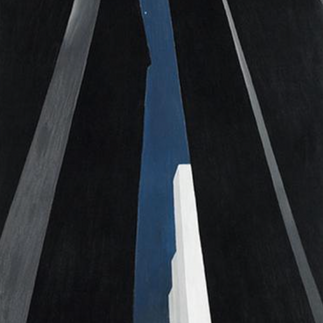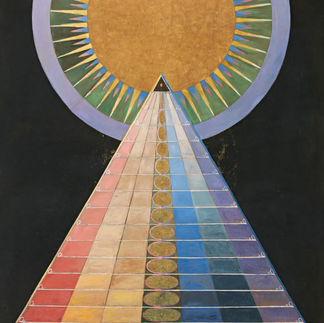Celebrating Women In Art: Recognising Female Artists on International Women's Day
- Christine Gardner
- Mar 4, 2024
- 4 min read
Todays surface pattern design industry, from what I see, predominantly features women making and selling art. Making money, creating trends, creating jobs, building careers, and making waves. But when my 8-year old daughter was introduced to art history at school recently, only male artists were discussed.
So this post is to celebrate my favourite females in art history - ones I have loved for a long time, and ones I have just discovered from doing research for this post, and yes - I will be taking it to the school!
So let's start with some history and stats. This is taken from the Tate website:
According to the National Museum of Women in the Arts, 51 per cent of visual artists today are women. But when it comes to exhibitions and gallery representation, the numbers tell a less optimistic story. In London, for example, 78 per cent of the galleries represent more men than women, while only 5 per cent represent an equal number of male and female artists.
And beyond the statistics, women artists and curators face unique challenges, from the subjects they bring to light to the work they choose to present. As Tate Modern director Frances Morris has said, women have been discriminated against for centuries, and major institutions have typically failed to support the careers of women artists working on the margins. The number of women in the Tate collection is growing, and half the rooms in the Natale Bell Building are currently devoted to a sole female artist, but work remains to be done.
Not only are women under represented in art galleries and in school education, there is an underlying narrative of not making money from art too.
A young girl came up to me and said that she wanted to be an artist like me but then added that her mum said she wouldn't make any money from it so told her not to pursue it. I think this was probably very much the case in the past, and particularly hard if women were not getting support, acknowledgement or credit, but with more and more women creating and selling art as a side hustle or full time occupation in the modern day it's a narrative that needs to be retold.
That is another post for another day. But for now - here are 8 female artists that I want to recognise and put in the spotlight.
Georgia O'Keefe
American modernist artist
1887-1996
"I had to create an equivalent for what I felt about what I was looking at – not copy it."
Themes: Modern art, regional scenes, abstract shapes, radical florals, distinctive views
Materials: paper, pencil, charcoal, pastels, watercolours
Find out more: https://www.okeeffemuseum.org/about-georgia-okeeffe/
Why is her art important?: dramatic, forward thinking
Georgia O’Keefe, Red Canna, 1924
Georgia O’Keffe, From the Lake, 1924
Georgia O Keffe, City Lights, 1926
Beatrix Potter
English Illustrator
1866-1943
Themes: Art Nouveau, illustration, flora, fauna
Materials: pencil, watercolour, paint
Find out more: https://beatrixpottersociety.org.uk/
Why is her art important?: it's stood the test of time
Beatrix Potter, The Tailor Mouse, 1902
Beatrix Potter, Peter Rabbit, year unknown
Beatrix Potter, The Tailor leaving his workshop, 1902
Berthe Morisot
French Impressionist
1841- 1895
Themes: Impressionism, painting, domestic scenes, landscapes, gardens,
Materials: Oil, canvas, pencil, watercolour
Find out more: https://en.wikipedia.org/wiki/Berthe_Morisot
Why is her art important?: Charming, elegant, light, she was described as one of 'the three great ladies' of Impressionism in her time
Berthe Morisot, The quay at Bougival, 1883
Berthe Morisot, After Luncheon, 1881
Berthe Morisot, Boating on the lake, 1892
Gwen John
Welsh Painter
1876-1939
"I think a picture ought to be done in 1 sitting or at most 2."
Themes: Post Impressionism, self portrait, female portraits
Materials: Paints
Find out more: https://en.wikipedia.org/wiki/Gwen_John
Why is her art important?: After long been overshadowed by the larger-than-life personality of her brother, fellow painter Augustus John it's time for her to shine
Gwen John, Self-portrait, 1902
Gwen John, Woman sewing at a window, year unknown
Gwen John, Self-portrait with letter, 1907
Louise Élisabeth Vigée Le Brun
French Rococo
1755-1842
Themes: rococo colour palettes, neoclassical style, portrait, painting, landscapes
Materials: oil, canvas, wood
Why is her art important?: She created more than 800 pieces, with more than 30 portraits of Marie Antoinette and her family after being granted patronage
Le Brun, Marie Antoinette with a rose, 1783 Le Brun, Princess Louise of Prussia Princess Antoni Henryk Radziwill, year unknown
Le Brun, Self-portrait in a straw hat, c.1787
Hilma af Klint
Swedish Artist
1862-1944
Theme: abstract, modernism, symbolism,
Materials: paints, pencils
Find out more: https://hilmaafklint.se/
Why is her art important?: her work was among the first abstract art
Klint, series VII, No. 7d, 1920
Klint, Altarpiece No.1, Group X, 1915
Klint, de tio storsta, no 2, barnaaldern, 1907
Frida Kahlo
Mexican Artist
1907-1954
Theme: primitivism, surrealism, self portrait
Materials: painting, oil, canvas, masonite
Find out more: https://en.wikipedia.org/wiki/Frida_Kahlo
Why is her art important?: used her art to help better understand emotional and physical suffering
Frida Kahlo, Self-portrait in a velvet dress, 1926
Frida Kahlo, The two Fridas, 1939
Frida Kahlo, Self-portrait with monkey and parrot, 1942
Maria Sibylla Merian
German Illustrator
1647-1717
Theme: baroque, illustration
Materials: painting, engraving, drawing, scientific, naturalism, florals, animals
Find out more: https://www.themariasibyllameriansociety.humanities.uva.nl/
Why is her art important?: Art and science combine to create beautiful imagery that inspire artists, writers and scientists alike
Merian, Untitled, year unknown
Merian, Untitled, year unknown
Merian, Untitled, year unknown
How many of these female artists did you know, how many pieces of their art have you seen? Let me know what you thought of this collection of works, how they make you feel, does it make you feel any different that they are all created by women?
Happy International Women's Day to all women artists everywhere, let your voice be heard and your art be seen.
















































